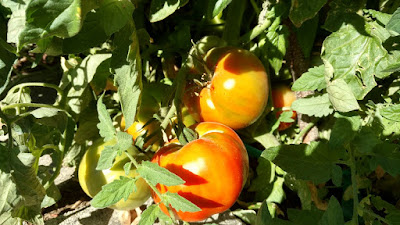Dig In: Garden checklist for week of July 21
 |
| In high heat, pick tomatoes that appear to be peaking. That helps the vine survive and gives the remaining tomatoes a better chance. |
By Debbie Arrington
Some like it hot, but not too toasty. Triple-digit temperatures are forecast for most of this week in the greater Sacramento area. That heat rapidly speeds ripening. Tomatoes can go quickly from not quite ready to bursting.
Don't let your tomatoes explode. Pick any that appear to be peaking before they turn soft on the vine. (They'll continue to redden on the counter, although they won't develop more sugars.) That also lightens the vine's load and helps it survive intense heat, giving those remaining green tomatoes a better chance.
Elsewhere in the garden, focus on clean-up and keeping your plants comfortable:
*Harvest beans, pepper and eggplants. Keep an eye on squash; pick them when they're still small.
* Water deeply. Even in high heat, most established gardens in Sacramento can get by with deep irrigation twice a week. Plants in containers will need more.
* Don't let soil dry out completely around tomatoes, eggplant or peppers. That helps prevent blossom end rot, the brown spots that may form at the base of those crops. The plants need moisture around their roots to take up nutrients while fruit is forming and those tomatoes are growing fast!
* Mulch can be your garden's best friend. It conserves moisture while blocking out weeds. But don't let mulch mound around stalks, stems or trunks. That can promote rot and fungal disease.
* Pick up after your fruit trees. Clean up debris and dropped fruit; this cuts down on insects and prevents the spread of brown rot. Then, feed fruit trees with slow-release fertilizer for better production for next year. Always water deeply before applying fertilizer.
*Feed citrus trees their last round of fertilizer for the year. This will give a boost to the fruit that's now forming.
* From seed, plant one last double row of corn. Also plant beans, pumpkins, radishes, winter squash and sunflowers, either from seed or transplant.


Comments
Post a Comment